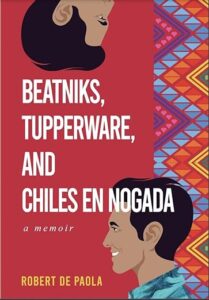Beatniks, Tupperware, and Chiles en Nogada
Wrenched at the age of five from his Mexican family in Baja California, Robert lives with his unconventional birth mother who works as a traveling Tupperware salesman in 1950s Southern  California. Their many adventures include living with a World War II veteran suffering from PTSD, reciting poetry to the rhythm of bongo drums in a Beatnik Commune, and extended periods of homelessness.
California. Their many adventures include living with a World War II veteran suffering from PTSD, reciting poetry to the rhythm of bongo drums in a Beatnik Commune, and extended periods of homelessness.
Robert, a former professor at an Ivy League college and founder of a successful nationwide software company, emerges as a scholar searching for a feeling of belonging and a family. His journey takes him to both coasts of the US, to Europe, and finally, to a remote, mountainous region in Mexico. There, he rediscovers love where he least expects it, and finds a place to call home.
Beatniks, Tupperware and Chiles en Nogada is written with humor, heart, and an understanding of how complex humanity can be. It is a celebration of the human spirit that will captivate the reader with unforgettable characters and exotic locales.
Purchase Beatniks, Tupperware and Chiles en Nogada
Book Excerpts
JOY OF CHILDHOOD
- Chapter: Abuelita, Page 3-4
The beach at Ensenada replaces the memory of the puppies. I’m running fast in zigzags on hard beach sand in the salty wind as I look for signs of clams. When I see tiny holes in the sand at the inlet, I know what to do because I am the best clam hunter in the family. I close my eyes so my feet can feel better; then, I twist my feet with a squishy-wishy motion to burrow into the sand until the tip of my right toe touches a rock-hard shell. I fall to my knees and begin to dig. Then I jump and wave the clam in the air. In those times, I could jump so high my feet almost never had to touch the ground. Every time I jump, I shout, “Almeja, almeja, almejaaa! Mira, mira—una grande!” Later that day, Abuelita makes a fire with wood we find on the beach and cooks a great pile of clams in her clam pot. Wow! I still remember how good the clams taste when I bite into the fat gushy part, and the fishy liquid explodes in my mouth. It’s the best taste there is.
- Chapter: Nonna and Nonno, Page 81
Does that mean I’m Italian too?
When Nonna turned her head to look at me, our noses bumped together. She said, “Si, bambino, you’re Italian because you came from us. Didn’t your mother teach you that? And you have a beautiful Italian name to prove it.” I said, “Wow, I’m someone.” For years, I was the kid with a funny-sounding name that nobody could pronounce right. … But now I knew where I came from. My name wasn’t funny-sounding anymore. It came from all the way back when there were Roman Emperors and gladiators.
- Chapter: Peter Paul and the Beatniks, Page 68
The poem that I liked best was “The Congo.” Peter Paul knew it so well that he didn’t even have to look at the book to recite it. He would dance around with his cigarette in hand, flailing his arms and beating out the rhythm with his feet. The gyrating ember from the cigarette lit up spooky crackling patterns in the plumes of smoke rising to the ceiling of the room. When I finally learned the poem by heart, I got terrifically excited because the words, clapping, and foot-stomping blended together to sound like African drums. We would all shout together as loud as we could. I’d close my eyes and twirl around. As I danced, I imagined myself in the jungle with a tribe of black Africans with their red eyes glowing like torches. They all whirled around me like a giant ring of fire while birds and monkeys screeched in the dark.
ROMANTIC
- Chapter: Rosie, Page 258
Rosie and I embraced for the first time early Sunday morning in front of her house on Puebla Street before I embarked on what was to be my last road trip to Florida. The embrace began as a mere courtesy—little more than a pantomimed hug. Yet after that momentary touch, Rosie’s grasp tightened, and I felt a thrill of warmth pass through my body. Startled, I released her. “I’m so sorry, Rosie,” I said. “I shouldn’t have.” She snickered and said, “Perhaps we should have a long time ago.”
- Chapter: The Treasure Chest, Page 288
As I waited in the bus terminal the next morning, I remembered the fragrance of a flower Rosie had worn in her hair several months ago. We had attended a friend’s birthday party, and I remembered being stunned by the intensity of the pride I had felt when I was with her. Rosie had said, “Take my arm.” We danced with the flower inches from my face. I then thought of my long past life of forever looking ahead, always striving to meet the next challenge, but never bothering to live in the moment. Guys like me who missed the love boat don’t get what they want. They take what they get. How, then, did I get so lucky? I had finally found a dream that I couldn’t have imagined existed on the slopes of a volcano in a faraway village in the highlands of Central Mexico.
GOSSIP
- Chapter: Twilight in Carroll Gardens, Page 184
During those hot Sunday afternoons, I witnessed two practiced gossip artists at the peak of their powers—their feints and their parries, their occasional jabs. I became privy to the most intimate details of sex lives, criminal activities, and broken marriages of the … community. My sole role was to be the audience to a verbal ballet essential to the human condition—the purest and oldest form of entertainment. The expert badinage of Josephine and Lou was the exquisite result of millions of years of evolution that began with two cave girls ragging on the saggy loincloth of the tribe’s best hunter.
HORRIFIC/DEATH
- Chapter: Matamoros, Page 314
Rosie and I arrived at his house minutes after he had taken his last breath. There was nothing left of our dear Polo than a dry bag of bones. His paperthin lips were drawn back to expose ghoulish teeth—a life-sized shrunken head whose face was frozen in a horrid grimace of one who had died mid-gasp. Rosie rushed to his side and began blowing into his mouth. Polo’s mother was inconsolable—Polo was her only child. After a few moments, Rosie elbowed me and whispered,
EXOTIC LOCALES
- Chapter: Matamoros, Page 308
Matamoros, Mexico, is a frightening place. Kill the Moors is the literal translation of the city’s name, an echo of Spain’s violent past recreated along Mexico’s northern border today. It has long been a center of human and drug trafficking. The authorities frequently uncover mass graves. Duffel bags full of severed human heads and other body parts are occasionally found. Kidnapping is an industrial-scale criminal activity. In Matamoros, luxury hotels promote machine gun nests that guard their entrance gates as an amenity. The city is a war zone with a complex list of combatants—drug cartels, corrupt police, and Zetas. People are frightened most of the Zetas, a street gang of heavily armed, drug-crazed teenage toughs that assault any time of the day or night. Matamoros is the lurid headline of a tabloid that you glance at while waiting in the checkout line of your local supermarket.
- Chapter: Rosie, Page 259
Popocatepetl, affectionately known as Popo, was our volcano, for we were perched precariously on its slope. This alien-sounding name means “Smokey Mountain” in Nahuatl, the language of the Aztecs and the many ancient peoples that came before them. The elderly residents of my new home speak Nahuatl as their first language, and there are nearby towns where it is the principal language. In these ancient pueblos, teachers employ Nahuatl to teach elementary school children how to speak Spanish. The vastness of the volcano beggars belief. It completely dominates the landscape and the culture. At night it blocks out a gargantuan triangle of stars. If one stares long enough, it appears to loom ever larger. Sasha, a friend from Florida, had to cut her visit to my new home short because she couldn’t escape the fear that the volcano was falling onto her. The fear is not irrational. Nothing that juts so astonishingly into the sky can be stable. Popo affects all aspects of life in Atlixco. Residents of my new home do not give directions to turn left or turn right. It is always turn up or turn down. Even when Popo is not visible, up and down means toward and away from the volcano. Lefts and rights are meaningless compared to the mystique of the volcano embedded in the psyche of those who grew up in its presence.
CULTURAL
- Chapter: Rosie, Page 264
I’d had the experience of living in several cultures. As a graduate student and later an academic, I had spent extended stays in Germany and Sweden. Long before that, I had lived in what was then called Saigon and on the Chao Praya river in the outskirts of Bangkok. I learned that cultures can be vastly different, but that people are always the same. And couples always fight about the same things—money, children, and, of course, infidelities, both real and imagined. The latter type of infidelity is the most insidious because there can be no satisfactory penance or resolution—the battle lingers on.
- Chapter: Nocolaus Durchdenwald, et al., Page 158
I had no difficulty finding Dieter’s mother in the Augsburg Station because she looked uncannily like her son. Standing stiffly with a rumpled package clasped underneath her right arm, she greeted me with a boisterous, “Hello, Robert.” She opened the package and unfurled the contents while exiting passengers hurriedly flowed past us like a school of fish avoiding a rocky outcrop. My gift was a towel picturing a vintage fighter aircraft set in baby blue on a white background. The word Messerschmitt was printed in a gothic font above the plane. She beamed with pride.
Shocked, I said, “Thank you, Frau Phfeiffer, but this is really too much.”
“This was my going-away present when I retired from the company. I thought it would be a perfect gift for you. It’s authentic. You can use it at the beach or in the bath.” She proceeded to relate amusing anecdotes about her many years as an instruction manual editor at Messerschmitt.
- Chapter: La Mixteca, Page 291
For months, she slept in a closet and ate leftovers before chancing upon a [fellow] Mixtec speaker in a market stall who informed her it was customary to get paid for work. She was promptly terminated when, in her imperfect Spanish, she informed her employer of this practice. At that point, she changed her name to Esmeralda (Emerald) because she loved the sound of the name and the color of that particular shade of green. Soon, she found other menial employment because there were always jobs for those willing to work long hours for table scraps and pennies.
About the Author, Robert de Paola
Robert earned his doctorate from University of Pennsylvania where he became an Asst. Professor in the School of Medicine. He later founded PyraMed Health Systems, a nationwide software company. He presently lives in Florida with his wife, Rosa, and his daughters, Regina Sophia and Danna Melissa.

